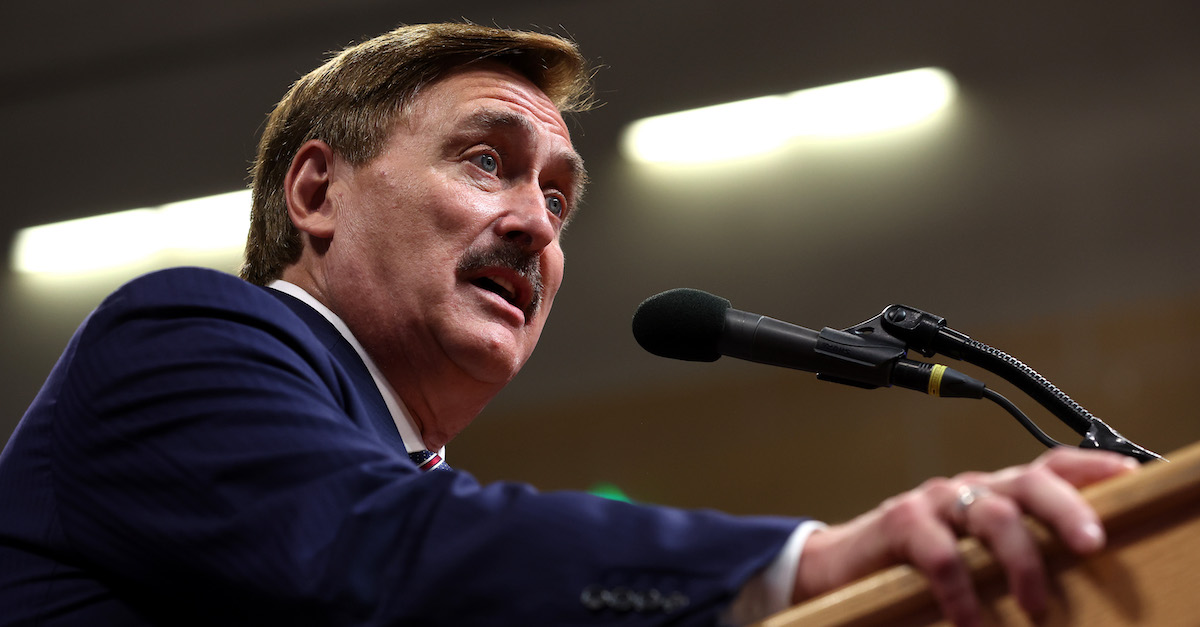
MyPillow CEO Mike Lindell speaks during a “Save America” rally at Alaska Airlines Center on July 9, 2022 in Anchorage, Alaska.
The Supreme Court kicked off its October term on Monday by releasing a lengthy orders list. Buried among the numerous denials of certiorari was MyPillow CEO Mike Lindell’s ask for the high court’s aid in dispatching Dominion Voting Systems’ defamation lawsuit against him.
“The petition for a writ of certiorari is denied. Justice Jackson took no part in the consideration or decision of this petition,” the Supreme Court said of MyPillow, Inc. v. US Dominion, Inc.
Lindell’s petition for certiorari, which was filed on June 17, asked the Supreme Court to take up one question, in the hopes of avoiding “expensive discovery and pretrial proceedings”:
Whether a critic of official conduct may immediately appeal under 28 U.S.C. § 1291 a district judge’s refusal to dismiss under New York Times Co. v. Sullivan a defamation complaint against him, if the critic’s motion to dismiss accepts the truth of all the allegations of the complaint, and its denial will result in his enduring long and expensive discovery and pretrial proceedings.
Dominion brought the defamation case against Lindell in Feb. 2021, alleging that the pillow salesman had profited off of telling the “‘Big Lie’ that Dominion had stolen the 2020 election.”
After losing out on both a motion to dismiss in the district court and an appeal in the D.C. Circuit, Lindell’s lawyers cited Justice Neil Gorsuch and Justice Clarence Thomas in asserting that the high court should disturb Times v. Sullivan, the landmark defamation law case:
Recent opinions by Justices Thomas and Gorsuch have questioned whether “[r]ules intended to ensure a robust debate over actions taken by high public officials carrying out the public’s business . . . leave even ordinary Americans without recourse for grievous defamation.” Berisha v. Lawson, 141 S. Ct. 2424, 2429 (2021) (Gorsuch, J. dissenting from denial of certiorari). See also the dissenting opinion of Justice Thomas and Justice Thomas, concurring in denial of certiorari, McKee v. Cosby, 139 S. Ct. 675 (2019)..
Essentially, Lindell asked SCOTUS if he could appeal the denial of dismissal right away so he could attempt to fend off the great costs associated with protracted litigation [emphasis theirs]:
He and MyPillow have asked a federal appellate court to consider his appeal from a district judge’s decision denying his Rule 12(b)(6) motion to dismiss a defamation complaint that fails to satisfy the constitutional standard announced by this Court in New York Times Co. v. Sullivan. The appellate court refused to decide the merits of Lindell’s appeal because it held that 28 U.S.C. § 1291 authorizes an appeal only from an adverse final judgment. This decision condemns any honest and tenacious critic of the administration of a public function to a monumentally exhausting and devastatingly costly judicial process before an appellate court has any opportunity to decide whether a district court has correctly applied the constitutional standard. It thereby obliterates the constitutional protection afforded by the non-controversial aspect of New York Times Co. v. Sullivan.
Alan Dershowitz was one of the attorneys on the petition.
[Image via Justin Sullivan/Getty Images]
Have a tip we should know? [email protected]